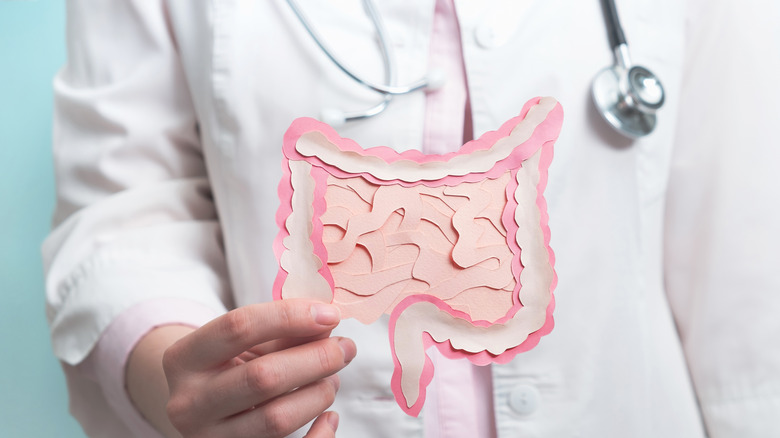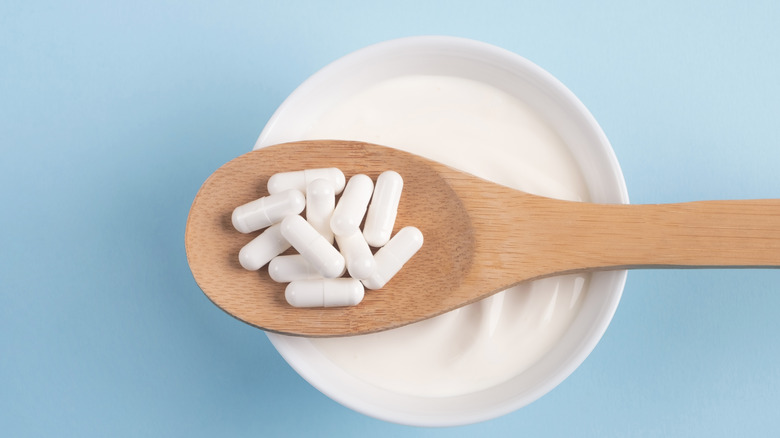Everything You Wanted To Know About Gut Health
Your gut — which includes the esophagus, stomach, and intestines — is an incredibly complex system necessary for your physical, mental, and emotional wellbeing (via UC Davis). Food is disassembled in the gut, and the nutrients are released into the blood to be transported around the body. A healthy gut will prevent bacteria, viruses, and fungi from proliferating and causing illness and inflammation. By having a healthy population of good-for-you bacteria, your body can battle these not-so-healthy invaders. Regrettably, 70 million people in the U.S. have a digestive disease.
You've probably heard the word "microbiome" thrown around a good bit as of late and might have wondered what exactly that is. The microbiome is all of the microorganisms in your body. In fact, you have roughly 10,000 different microbial species spread throughout your body, including in your reproductive organs, mouth, throat, lungs, ears, eyes...any part of your body that you can think of has microorganisms in or on it (via Forbes Health). And the gut microbiome, specifically, is proving to be one of the most important pieces when it comes to understanding overall wellness and disease prevention. Consider that 70% of your immune system resides in your gut, and you can see why we've been talking about the wellbeing of our microbiomes lately. Read on to learn everything you need to know about the role the gut plays in the body, and how to keep those systems in tip-top shape.
Symptoms of an unhealthy gut
According to UC Davis, the most common signs of gut health issues include "abdominal pain, bloating, loose stools, constipation, heartburn, nausea, or vomiting." Of course, these are symptoms that we all experience from time to time — but if you notice any of these issues becoming chronic, it might signify that a bigger problem is at work. Other more severe symptoms to look out for are stools that are black in color (which might indicate internal bleeding), unexplained loss of weight, intense vomiting or stomach pain, difficulty swallowing, pain while swallowing, or jaundice.
There are also a variety of other health conditions that might indicate an underlying gut issue. For instance, people with chronic fatigue may have an unhealthy gut. In one study published in Microbiome, a whopping 50% of people who complained of fatigue also had irritable bowel syndrome (IBS). Skin problems like acne, psoriasis, and eczema have also been linked to gut problems because of the inflammation caused by a poorly functioning digestive system. Allergies can be worsened by gut troubles, as can autoimmune conditions and migraines. In a bit of terrifying news: a study published in Clinical and Experimental Immunology in the summer of 2018 uncovered the fact that a specific bacteria in the gut "produces a protein that may trigger the onset of autoimmune conditions like rheumatoid arthritis, ulcerative colitis, and multiple sclerosis."
Small intestinal bacterial overgrowth (SIBO)
Small intestinal bacterial overgrowth (SIBO) is a condition caused by the presence of bacteria not usually found in the small intestine, or an over-proliferation of bacteria in that organ (via Mayo Clinic). It can occur due to surgery or disease, and causes symptoms like diarrhea and malnutrition. Other common symptoms might include nausea, a loss of appetite and weight loss, and bloating. It's not just the amount of bacteria that matters — the type of bacteria also affects the symptoms that a person might experience. For example, a proliferation of specific strains of bacteria that metabolize bile salts could cause fat malabsorption and diarrhea (via Gastroenterology & Hepatology). People with SIBO are most likely to be deficient in fat-soluble vitamins (vitamins A, D, E, and K), as well as vitamin B12 and iron. They sometimes have an excess of folate.
According to Healthline, SIBO is diagnosed by measuring the amount of hydrogen and methane expelled in your breath after drinking a high-sugar beverage. This is because excess bacteria in your gut release these gases. The University of Virginia Health System has created a fairly thorough review of foods to consume and those to avoid if you've been diagnosed with SIBO. It is essentially a low-sugar and low-fiber diet that is rich in both fat and protein. Bacteria, just like humans, love to get their fuel from sugar, so reducing your sugar intake can help keep your gut bacteria in check.
Alcohol is detrimental to gut health
Niket Sonpal, an internist and gastroenterologist in New York, pointed out in an interview with Well+Good that drinking too much alcohol is linked to heartburn, acid reflux, esophageal damage, and injury to the villi lining the walls of the small intestine, which subsequently can lead to SIBO and malnutrition. The dehydration from alcohol consumption can be blamed for the constipation you might experience after a big night out. Luckily, for those of us who have overindulged recently, Sonpal told Well+Good that "the stomach is a resilient organ that bounces back pretty quickly." By abstaining for a few weeks, gastritis and ulcers will both improve.
In a study published in Digestive Diseases and Sciences, researchers discovered that as little as one drink can cause SIBO, resulting in symptoms like bloating, gas, abdominal pain, constipation, and diarrhea — and only four of the nearly 198 participants drank more than one alcoholic beverage daily! If you're struggling with uncomfortable gastrointestinal symptoms, you might want to cut back.
Meat might be hurting your GI health
Unfortunately for meat lovers, it turns out that your Sunday roast may lead to gut trouble. A paper published in Nature Microbiology details how the digestion of animal products — especially red meat — leads to the growth of a molecule known as trimethylamine-N-oxide (TMAO) in the gut. TMAO, in turn, has been linked to heart disease. Researchers also contend that the carbohydrate in red meat, Neu5Gc, are not recognizable by our bodies as foreign and are absorbed by human cells just like our own sugars are, triggering a cascade of inflammation and antibody production.
In a fascinating study published in Nature, researchers gave nine participants two very different diets for five days each. The first five days were heavy in animal products like eggs and meat. Then, after a break, the second five-day period of a fiber-rich diet was initiated. It turns out that the protein-rich diet had near-immediate negative impacts on the microbiome. In an interview with NPR, study contributor Lawrence David, a microbiologist from the Center for Gastrointestinal Biology and Disease at the UNC School of Medicine, explained that "The relative abundance of various bacteria species looked like it shifted within a day after the food hit the gut." The genetic makeup and behavior of the microbes changed after three days on either diet. Bilophila, microbes that literally "love bile," flourished on the meat-rich diet. This is understandable since bile is necessary for fat digestion — their proliferation was, in essence, a compensatory mechanism. Unfortunately, while researchers already knew that Bilophia causes inflammation and colitis in mice, this study suggests it may also lead to inflammation in humans (via NPR).
Sugar is bad news for the microbiome
We have some disappointing, if perhaps unsurprising news: That slice of chocolate cake you had for dessert won't do your gut health any good. Sugar definitely causes inflammation, and this inflammation changes the bacteria living in your gut (via Psychology Today). It might also explain, in large part, why research has found that the Western diet, rich in sugars and fat, seems to weaken the intestinal wall, making microbes that reside there more likely to gain entrance to the bloodstream.
EatingWell further explains that the inflammation brought about by eating too much refined sugar irritates the gut and damages the protective mucus layer that lines the gastrointestinal tract. One study published in Science Translational Medicine found that a diet high in refined sugars increased the prevalence of digestive disorders, such as colitis, in mice. Similar studies involving humans have found that diets containing over 165 grams of refined sugar per day had significant negative impacts on gut function compared to diets containing no more than 60 grams of the sweet stuff.
Obesity and a lack of microbial diversity are linked
Most of us know the oft-repeated mantra for successful weight loss: Eat less and move more. Yet, for some of us, the math just doesn't seem to add up at the end of the day. There has to be another explanation, we think. What if it comes down to the microbes in your gut? From the time that you are born, it appears that the bacteria inhabiting your gut determine a large part of your wellbeing, including your risk for both obesity and diabetes (via Scientific American). It seems that obese people have less variety of microbes in their guts. In contrast, lean people have a diverse population, including many different types of Bacteroidetes, tasked with digesting fiber for energy.
Some research on mice is indicative of this: baby mice were raised in a germ-free environment and then populated with microbes taken from one of a set of twins — in each twin set, one was obese and the other lean. The rodents that received the bacteria from the obese women gained more weight and stored more body fat, even when researchers fed the two types of mice an identical diet. However, when the mice were exposed to the microbes from the lean mice, the trend reversed. But then, researchers changed up the mice's diet: When the mice were fed a chow high in fat and low in fruits, vegetables, and fiber to mimic a Western diet, the mice with the microbes associated with obesity grew fatter. Even more worryingly, they didn't improve even with exposure to the microbes from the lean mice. The Westernized diet prevented the healthy microbes from proliferating.
Food intolerances could be the cause of your symptoms
Food intolerances affect up to one in five people and are most likely to occur in people with digestive problems such as IBS (via Medical News Today). People with a food intolerance either lack the digestive enzymes necessary to process food, or are sensitive to certain chemicals in food. Symptoms of food intolerance are vague, and many people make them the scapegoat for other health issues, including "bloating, flatulence, belching, stomach pain, diarrhea, migraine, headaches, a runny nose, and a general feeling of unwellness."
As the Mayo Clinic explains, a food allergy causes an immune system reaction that can be life-threatening and lead to symptoms such as anaphylaxis. In contrast, food intolerance can be deeply uncomfortable, but is never fatal, does no lasting harm to the body or immune system, and is confined to gastrointestinal tract symptoms. People with food intolerances can take enzymes or eat modified food products, while people with food allergies cannot avoid a reaction this way. For example, someone with lactose intolerance could take Lactaid or a similar product, or consume products specially formulated to exclude lactose. However, someone with a milk allergy must strictly avoid milk and any derivatives of it.
Prebiotics, probiotics, and postbiotics
You've almost certainly heard of probiotics, and there's a good chance that you've also heard of prebiotics, but postbiotics haven't been discussed much until recently. Prebiotics are a form of fiber, and the healthy bacteria that colonize your gut love them (via Mayo Clinic). Eating plenty of whole grains, fruits, and vegetables such as onions, leeks, asparagus, barley, and oats will guarantee that the good bacteria living in your gut will be happy. Those healthy bacteria are probiotics, which feast on the prebiotics that you ingest. You can get probiotics from chowing on fermented foods such as yogurt, kefir, kombucha, and even sauerkraut.
Postbiotics are compounds created in the body as a byproduct when probiotics consume prebiotics (via Healthline). And as it turns out, postbiotics are actually responsible for health benefits experienced from ingestion of probiotics. For example, various postbiotics, including certain short-chain fatty acids, seem to bolster the immune system, reduce inflammation, and improve symptoms related to digestive problems. These short-chain fatty acids appear to be especially beneficial for individuals with conditions such as irritable bowel syndrome, ulcerative colitis, or Crohn's disease. Postbiotics might also be helpful for people who have allergies, struggle to lose weight, or have either high blood pressure or elevated glucose levels. Though supplements aren't yet commonly available, they can be found at specialty health stores. As always, you should consult your healthcare professional before adding any supplement to your routine.
Adequate fiber is critically important for gut health
The dietary fiber in vegetables, fruit, beans, and whole grains reduces the risk of a variety of digestive ailments including constipation, hemorrhoids, and diverticula (via Everyday Health). The soluble fiber found in foods such as oats and beans dissolves in water, and insoluble fiber does not dissolve in water and is found in foods including wheat and seeds. Medline Plus explains that soluble fiber might help prevent heart disease, while insoluble fiber bulks up stool and speeds up the transit through the stomach and intestines.
When broken down by the microbes that reside in the gut, fiber produces metabolites such as short-chain fatty acids (via Nutrients). Those short-chain acids, once absorbed into the blood, improve our cells' willingness to take up glucose from the blood, help with the maintenance of healthy body weight, and aid in quelling the flames of inflammation that are to blame for so many of our modern health concerns. Additionally, when fibrous prebiotics are fermented in the gut, they create an acidic environment that is inhospitable to bad bacteria (via Everyday Health).
One caveat, though: According to holistic gastroenterologist Albert Snow, "If you have any kind of inflammatory bowel disease such as IBS, colitis, leaky gut, etc. do not take any kind of bowel cleanser or supplement — you will definitely make your problem worse" (per Everyday Health).
The gut and your brain are in constant communication
Perhaps you've noticed a gnawing sensation in your stomach before having to do something that you've been dreading, or you've developed "butterflies" before speaking in front of a group. All of our feelings can trigger gastrointestinal symptoms; even positive scenarios such as falling in love or being excited about a career prospect can affect our delicate tummies (via Harvard Health Publishing).
As the American Psychological Association explains, that the neurons in the gut are communicating with the brain incessantly. For this reason, negative early experiences in life can permanently alter nervous system development and increase the risk for gastrointestinal problems later in life. It also accounts for why stress can cause diarrhea or constipation, and instigate painful spasms in the intestines. Contrary to popular lore, stress cannot cause ulcers — those are brought on by a bacterial infection — but stress can worsen the discomfort ulcers cause.
Your gut and sleep habits are interconnected
There's an intricate relationship between sleep and gut health (via Henry Ford Health System). Perhaps unsurprisingly, lack of sleep increases stress, which increases the body's level of stress hormones and can increase gut permeability. This allows food and toxins to enter the bloodstream where they wreak havoc, causing bloating and pain, and sometimes even altering the gut microbiome and triggering food sensitivities. Lack of melatonin, the hormone that many people rely on in supplement form to get a good night's rest, might be associated with GERD. If your melatonin levels are off, you might have difficulty falling asleep and suffer from symptoms of GERD such as belching, a burning sensation in your stomach, and even a dry cough.
The relationship also goes the other way — your gut can have a meaningful impact on your sleep. For instance, a recent study conducted in Japan determined that depletion of microbes in the gut decreased the body's production of serotonin, affecting sleep-wake cycles (via Scientific Reports and Medical News Today). Besides possibly affecting brain development and memory construction, the gut microbiome seems to have significant consequences on the body's natural circadian rhythms. The study involved splitting 25 genetically identical eight-week-old mice into two groups. Researchers provided one group of mice with access to antibiotic-spiked water while the other group consumed regular water. After four weeks, the mice receiving antibiotics had way lower levels of intestinal metabolites. According to the researchers, the antibiotic-infused water "totally shut down the tryptophan-serotonin pathway." This lack of serotonin likely explains why the mice receiving antibiotics demonstrated more REM and non-REM sleep at night and less during daylight hours. Remember that mice are nocturnal animals, so this is the equivalent of us sleeping through the day.
Your gut is one more reason to get up and move
Here comes more talk about those short-chain fatty acids! Yes, they really are that important. Exercise, it turns out, stimulates the growth of bacteria that produce these fatty acids, such as butyrate (via The Conversation). Butyrate is an especially valuable player among the fatty acids because it helps keep the gut lining healthy. Simply walking for three hours a week at a brisk pace might be enough to shift your microbiome and can help balance out the negative effects caused by a high-fat, low-fiber diet. Exercise also seems to improve mucus secretion by helping certain valuable bacteria — such as A. muciniphila — adhere to the lining of the stomach. Even though mucus might have a negative connotation in your mind, you want it in your intestines to protect these organs against unhealthy bacteria. A. muciniphila has also been proven to help reverse weight gain and insulin resistance, and appears to decrease inflammation.
Interestingly, this is likely another case where too much of a good thing is possible. Though some exercise is clearly beneficial, according to a review article in Frontiers in Nutrition, intense exercise can increase the permeability of the gastrointestinal wall and diminish mucus production in the gut — both of which can allow pathogenic bacteria to enter the bloodstream and increase inflammation.
The gut and mental health
The enteric nervous system (ENS) refers to millions of nerve cells located throughout your digestive system, everywhere from your esophagus to your intestines (via Johns Hopkins Medicine). The ENS orchestrates digestion and communicates with your brain. This relationship is why mental health conditions such as anxiety and depression are known to influence the course and outcomes of so many "physical" problems, including irritable bowel syndrome and constipation. It also explains why researchers have discovered that gastrointestinal symptoms prompt the central nervous system to trigger mood changes. These connections explain why IBS and bowel disorders are often responsive to antidepressants and cognitive behavioral therapy.
The term "psychobiotic" might sound a little sci-fi, so let's break it down: these are specific strains of probiotics that are supposed to help ease anxiety (via Discover). To confirm this relationship, researchers studied rats that had been exposed to stress starting at birth (via Science Translational Medicine). By the time they were grown the rats had developed both IBS and mood disturbance, and they had a less diverse population of microbes in their guts than healthy rats. And when stressed mice were given Bifidobacterium for five weeks, they became more mobile, active, and willing to interact with each other and explore new areas. These mice produced more tryptophan (an amino acid that is a precursor for serotonin) and brain-derived neurotrophic factor (BDNF), which helps with neuron generation. While more research will need to be done to determine if these findings can also apply to humans, scientists increasingly believe that improving your gut health may be a vital component of mental health treatment (via Discover).
Chronic pain and the gut
As summarized in Practical Pain Management, researchers have known for a long time that the microbiome and chronic pain are interrelated, and that the status of the gut plays a key role in the development and management of chronic conditions ranging from fibromyalgia to migraines. For instance, scientists recently discovered that an imbalance in the microbes within the gut increases tumor necrosis factor-alpha production; the study findings were published in Molecular Neurobiology. This protein, TNFa, causes migraine pain and inflammation within the trigeminal nerve system (which sends pain sensations from the face to the brain). In another study, researchers even suggest that manipulating the bacterial content of the microbiome could help to battle the residual mental problems of opioid addiction following treatment (via Neuropsychopharmacology).
If you have joint and bone pain, you might want to give your gut some love and attention. While many people are beginning to believe that changes to the microbiota could predispose someone to fibromyalgia syndrome, in 2013 a study found that individuals with rheumatoid arthritis were significantly more likely to have a specific microbe in their intestines than people without the disease (via eLife). In a more recent study published in Arthritis Rheumatology, psoriatic arthritis was also linked to deficient levels of different bacteria that reside in the intestines.















